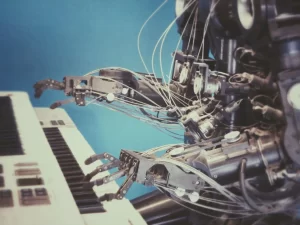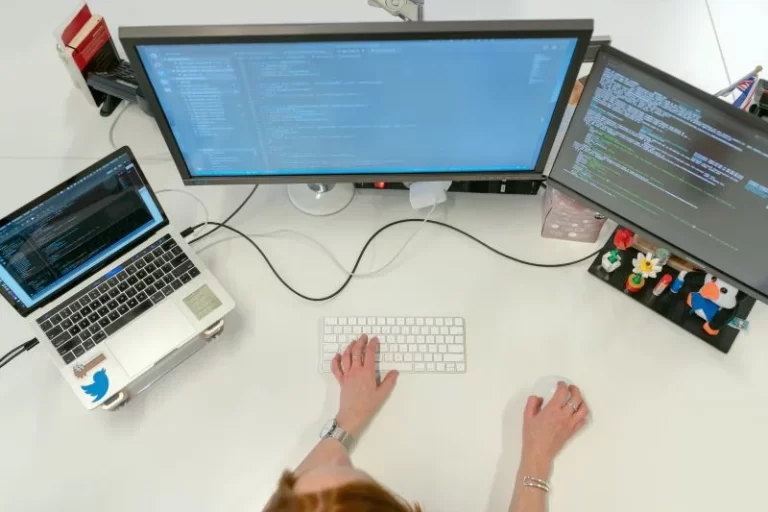What is Robotics?
The design, construction, programming, and use of robots—intelligent machines capable of performing tasks autonomously or under human control—are all included in the multidisciplinary discipline of robotics.
The fields of computer science, cyber security, mechanical and electrical engineering, artificial intelligence, and even psychology are all combined with elements from other scientific and engineering fields. It has the potential to transform entire industries and significantly enhance our daily lives.
For many reasons, embracing it as a field of study or a career can be immensely fulfilling.
First of all, it presents a chance to lead technical advancement and push the envelope of what is conceivable. The industry is continually changing, offering fresh difficulties and chances for innovation and problem-solving.
Second, robots has a big impact on society. In addition to automating tedious jobs and boosting manufacturing productivity, it has the potential to improve healthcare with surgical robots and support disaster response with autonomous search and rescue equipment.
It also develops important abilities. It fosters a solid foundation in STEM (Science, Technology, Engineering, and Mathematics) disciplines through cultivating expertise in mechanics, electronics, programming, and other fields.
Successful robotics projects require teamwork and collaboration, which foster interpersonal skills and the capacity to function in a variety of organizations.
Robotics also encourages innovation and entrepreneurship, enabling people to develop ground-breaking ideas and even launch their own businesses.
In the long run, selecting robots is about accepting a future in which intelligent machines collaborate with people to improve the planet.
It’s about influencing the technical environment, being a part of a community that pushes the limits of what is possible, and learning skills that are both personally gratifying and extremely relevant in a work market that is continuously evolving.

In order to develop, build, and control robots, it is a multidisciplinary field, incorporates elements of engineering, computer science, mechanics, and artificial intelligence.
These robots can handle a variety of jobs, from straightforward repetitive activities on assembly lines to complicated operations in difficult conditions like space exploration or disaster relief.
For many reasons, choosing a job or pursuing education in this field can be quite gratifying.
First off, these are at the front of technological advancement, consistently pushing the limits of what machines are capable of.
Being a member of this sector allows you to make ground-breaking discoveries that will influence the future of automation, healthcare, transportation, and other areas.
Secondly, robotics offers the opportunity to address real-world challenges, such as enhancing efficiency in industries, improving the quality of life for people with disabilities, and mitigating environmental risks.
Furthermore, it provides a dynamic and intellectually stimulating environment, requiring a diverse set of skills and knowledge. Collaborating with experts from various domains fosters creativity and fosters continuous learning.
In conclusion, choosing this field opens doors to pioneering work, meaningful contributions to society, and a stimulating career that embraces innovation and problem-solving.
The study of the design, manufacture, use, and application of robots is also known this field .
It combines components from several fields, such as artificial intelligence, computer science, mechanical engineering, and electronics, to build robots that can carry out activities on their own or with human assistance.
These jobs can include production and assembly in commercial settings, risky environment exploration, medical support, and even entertainment.
Why should I choose robotics?
There are several strong arguments in favor of choosing this field as a subject of study or a line of work.
First of all, robots has the ability to transform companies by increasing their productivity, decreasing the need for human labor in risky or monotonous jobs, and producing ground-breaking answers to difficult problems.
Second, it offers a rare chance to work with cutting-edge technology while expanding the realm of the conceivable.
Given that it is a sector that is continuously changing, it stimulates innovation, problem-solving, and lifelong learning.
A job in this filed can also significantly advance society by solving issues like healthcare, the environment, or expanding our understanding of the world through autonomous exploration.
Furthermore, because of their specialized knowledge, robotics professionals are in high demand and frequently earn good wages.
The need for experienced roboticists is anticipated to increase further as this program is increasingly incorporated into several facets of our life, from advanced production systems to smart household appliances.
People can help shape the future, make a difference in a variety of industries, and be a part of a field that has enormous potential for both technological and societal improvement by selecting this field.
Engineering and computer science combine to form the interdisciplinary area of robotics, which is concerned with the creation, maintenance, use, and application of robots.
Robots are machines that can carry out tasks on their own or with human assistance. Several industries, including manufacturing, healthcare, and transportation, use them.

Career of Robotics:
A profession in robotics might be chosen for a variety of reasons. There is a big need for qualified people in the sector of this field, which is quickly expanding.
There is a growing demand for professionals who can design, manufacture, and program robots as they are used in more and more industries.
In addition to being extremely demanding and gratifying, robotics also provides the chance to engage with cutting-edge technology.
The following are some advantages of selecting a career in robotics:
- There is a high need for skilled labor: In the upcoming years, there will likely be a major increase in the demand for robotics experts. This is a result of the growing employment of robots across numerous industries.
- Difficult and rewarding work: It is an extremely difficult and satisfying field. It provides the chance to work with cutting-edge technology and resolve challenging issues.
- High pay: Its professionals frequently make a lot of money. This is because of the difficulty of the work and the great demand for their skills.
- This field is a booming industry with a high demand for qualified individuals, thus there is job stability. This indicates that future job security for those working in robotics is likely.
It is a fantastic choice if you’re seeking for a demanding and fulfilling job in a rising industry. The world is changing due to robots, and this field experts are responsible for this change.
Here, also briefly describe about robotics
Here are some examples of current applications of robotics:
- These are employed in manufacturing to automate processes like welding, painting, and assembly. As a result, there may be an improvement in worker safety as well as productivity and efficiency.
- These are utilized in the healthcare industry for a wide range of tasks, including patient care, rehabilitation, and surgery. It can help to raise the standard of patient care while allowing nurses and medical professionals to concentrate on other duties.
- In the field of transportation, robots are utilized to fly drones and self-driving cars.
- Transportation networks may become safer and more efficient as a result.
These are only a few examples of modern applications of this topic. Future robotics applications are likely to be even more ground-breaking and inventive as the field develops.






